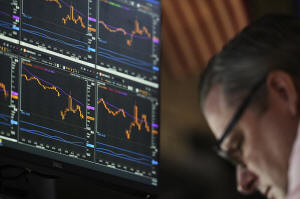US stocks dip after careening through a manic day following Trump's
latest tariff threat
[April 08, 2025] By
STAN CHOE, ELAINE KURTENBACH and DAVID McHUGH
NEW YORK (AP) — U.S. stocks careened through a manic Monday after
President Donald Trump threatened to crank his tariffs higher, despite a
stunning display showing how dearly Wall Street wants him to do the
opposite.
The S&P 500 slipped 0.2% at the end of a day full of heart-racing
reversals as battered financial markets try to figure out what Trump’s
ultimate goal is for his trade war. If it’s to get other countries to
agree to trade deals, he could lower his tariffs and avoid a possible
recession. But if it’s to remake the economy and stick with tariffs for
the long haul, stock prices may need to fall further.
The Dow Jones Industrial Average fell 349 points, or 0.9%, and the
Nasdaq composite edged up by 0.1%.
All three indexes started the day sharply lower, and the Dow plunged as
many as 1,700 points following even worse losses elsewhere in the world.
But it suddenly surged to a gain of nearly 900 points in the late
morning. The S&P 500, meanwhile, went from a loss of 4.7% to a leap of
3.4%, which would have been its biggest jump in years.
The sudden rise followed a false rumor that Trump was considering a
90-day pause on his tariffs, one that a White House account on X quickly
labeled as “fake news.” That a rumor could move trillions of dollars’
worth of investments shows how much investors are hoping to see signs
that Trump may let up on tariffs.

Stocks quickly turned back down, and shortly afterward, Trump dug in
further and said he may raise tariffs more against China after the
world’s second-largest economy retaliated last week with its own set of
tariffs on U.S. products.
It’s a slap in the face to Wall Street because it suggests Trump may not
care how much pain he inflicts on the market. Many professional
investors had long thought that a president who used to crow about
records reached under his watch would pull back on policies if they sent
the Dow reeling.
On Sunday Trump told reporters aboard Air Force One that he wasn’t
concerned about a sell-off and that “sometimes you have to take medicine
to fix something.”
Trump has given several reasons for his stiff tariffs, including to
bring manufacturing jobs back to the United States, which is a process
that could take years. Trump on Sunday said he wanted to bring down the
numbers for how much more the United States imports from other countries
versus how much it sends to them.
Indexes nevertheless did keep swinging between losses and gains Monday
after Trump’s latest tariff threat, in part because hope still remains
in markets that negotiations may still come.
“We’re not calling the all-clear at all, but when you have this type of
volatility in the market, of course you’re going to have back and forth”
in markets not just day to day but also hour to hour, said Nate Thooft,
a senior portfolio manager at Manulife Investment Management.
“We’re all waiting for the next bit of information,” he said. “Literally
a Truth Social tweet or an announcement of some sort about real
negotiations could dramatically move this market. This is the world we
live in right now.”
All that seemed certain Monday was the financial pain hammering
investments around the world for a third day after Trump announced
tariffs in his “Liberation Day.”

[to top of second column] |

An electronic display shows financial information on the floor at
the New York Stock Exchange in New York, Monday, April 7, 2025. (AP
Photo/Seth Wenig)
 Stocks in Hong Kong plunged 13.2%
for their worst day since 1997. A barrel of benchmark U.S. crude oil
dipped below $60 during the morning for the first time since 2021,
hurt by worries that a global economy weakened by trade barriers
will burn less fuel. Bitcoin sank below $79,000, down from its
record above $100,000 set in January, after holding steadier than
other markets last week.
Trump’s tariffs are an attack on the globalization that’s remade the
world’s economy, which helped bring down prices for products on the
shelves of U.S. stores but also caused production jobs to leave for
other countries.
It also adds pressure on the Federal Reserve. Investors have become
nearly conditioned to expect the central bank to swoop in as a hero
by slashing interest rates to protect the economy during every
downturn. But the Fed may have less freedom to act this time around
because inflation remains higher than the Fed would like. And while
lower interest rates can goose the economy, they can also put upward
pressure on inflation.
“The recent tariffs will likely increase inflation and are causing
many to consider a greater probability of a recession,” JPMorgan CEO
Jamie Dimon, one of the most influential executives on Wall Street,
wrote in his annual letter to shareholders Monday. “Whether or not
the menu of tariffs causes a recession remains in question, but it
will slow down growth.”
In the bond market, Treasury yields rallied to recover some of their
sharp drops from earlier weeks. Some of the big move may have been
because of reduced expectations for cuts to interest rates by the
Fed. Some analysts also said it could be due to investors outside of
the United States wanting to pare their U.S. investments.
The yield on the 10-year Treasury jumped to 4.20% from 4.01% late
Friday.

Earlier in the day, the S&P 500 briefly fell more than 20% below its
record set less than two months ago. If it finishes a day below that
bar, it would be a big enough drop that Wall Street has a name for
it. A “bear market” signifies a downturn that’s moved beyond a
run-of-the-mill 10% drop, which happens every year or so, and has
graduated into something more vicious.
The S&P 500, which sits at the heart of many investors’ 401(k)
accounts, is coming off its worst week since COVID began crashing
the global economy in March 2020.
All told, the index fell 11.83 points Monday to 5,062.25. The Dow
Jones Industrial Average dropped 349.26 to 37,965.60, and the Nasdaq
composite added 15.48 to 15,603.26.
___
Kurtenbach reported from Bangkok. McHugh reported from Frankfurt,
Germany. Associated Press writers Ayaka McGill, Paul Harloff, Matt
Ott and Jiang Junzhe also contributed.
All contents © copyright 2025 Associated Press. All rights reserved |